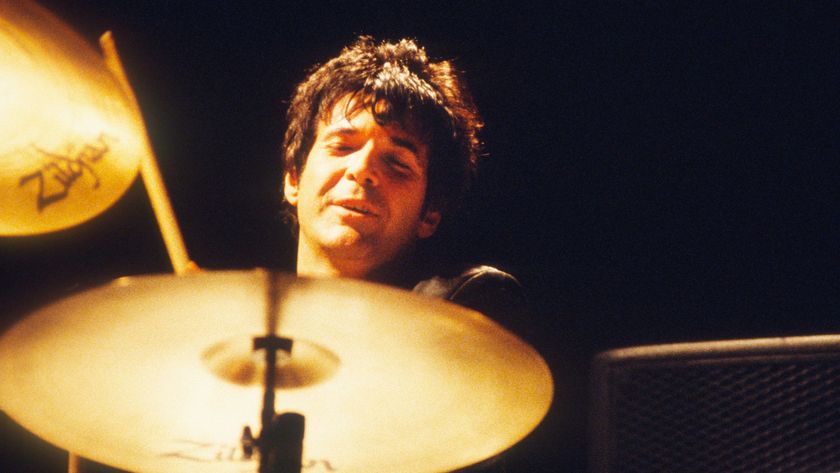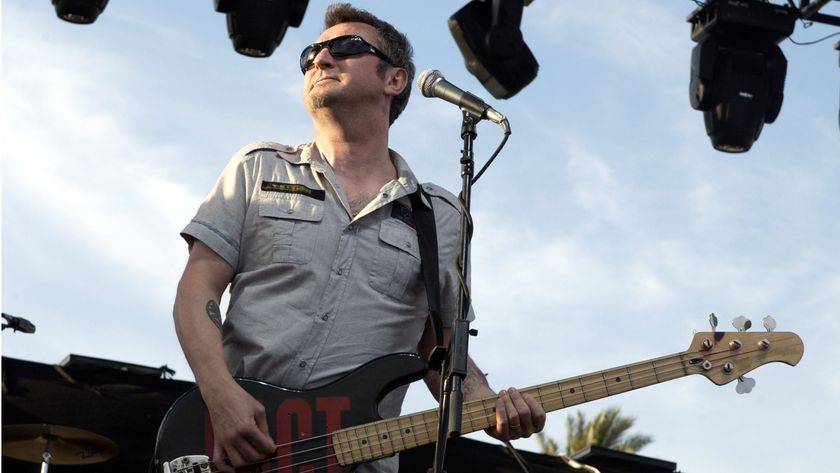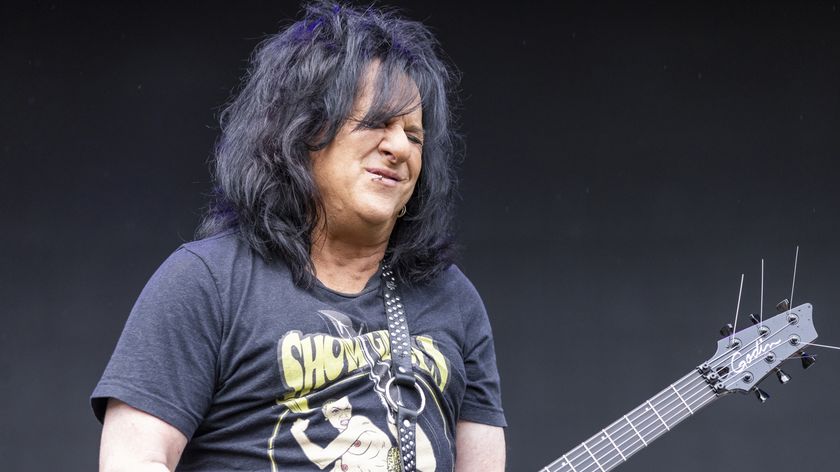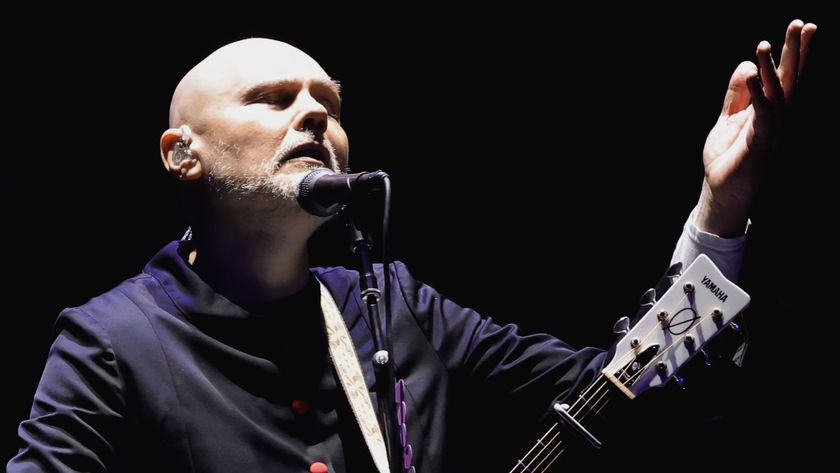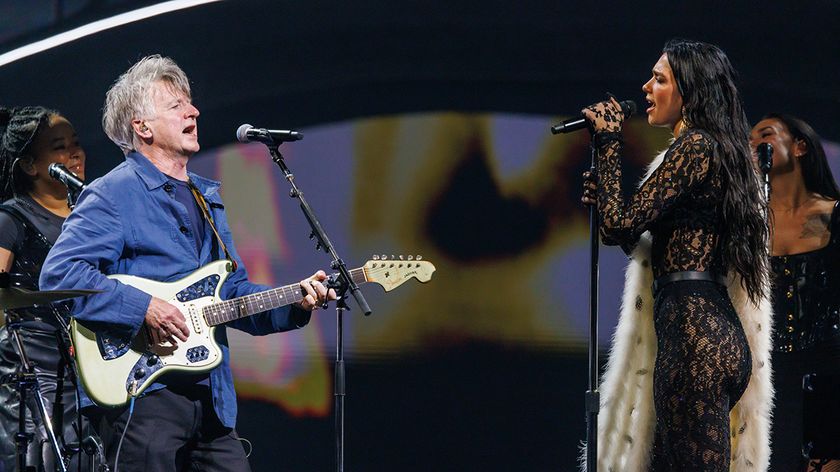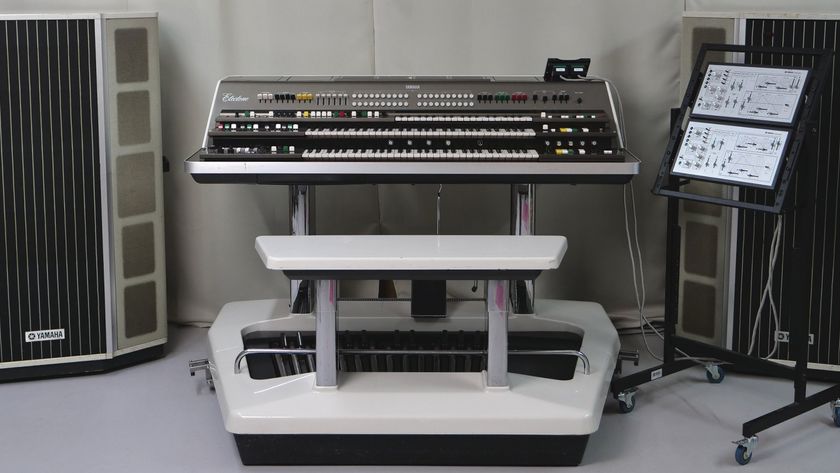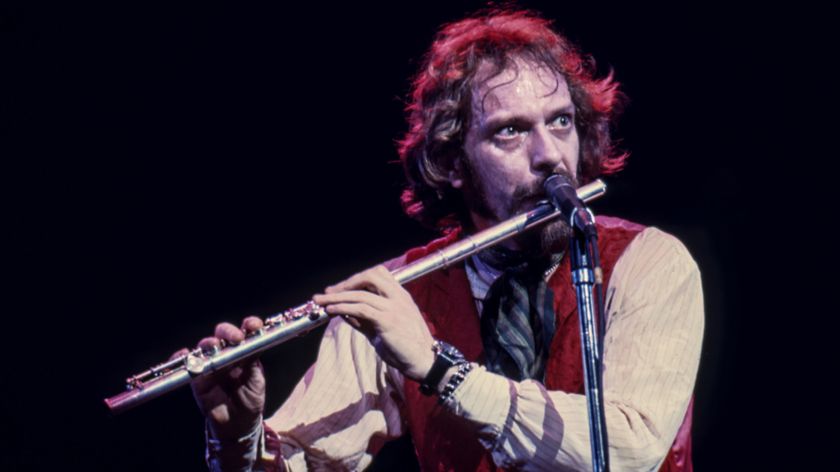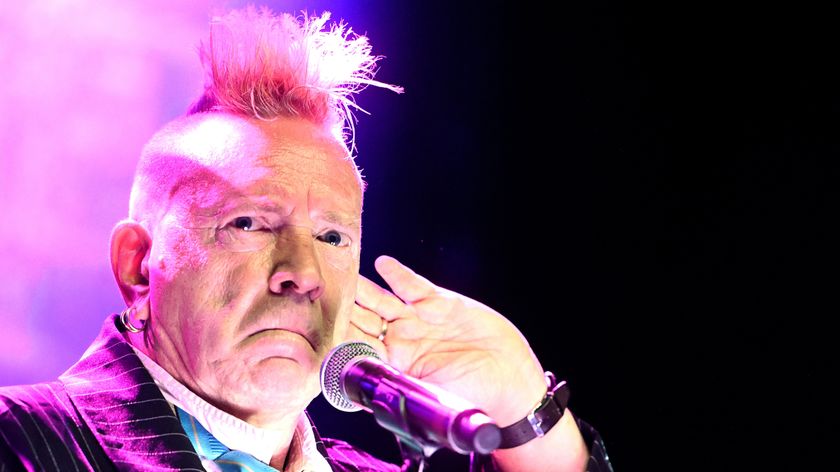Slash talks new album World On Fire
"It was almost like it wrote itself"
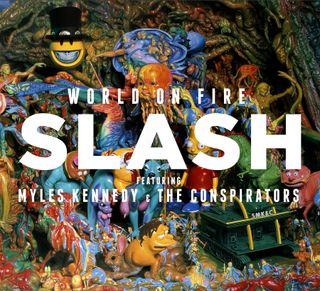
Slash talks new album, World On Fire
September will see the welcome return of Slash with his second album featuring Myles Kennedy And The Conspirators, World On Fire. It will be released as a special fanpack edition on September 15, before its standard release on October 13. And after a batch of Summer US dates, including dates with Aerosmith, the band will hit Europe for an arena tour in November.
But ahead of all that, Slash has given Total Guitar writer Stephen Lawson the preview scoop on the guitar playing and gear behind the new record and why it finds him and the band on a creative roll.
What was the writing process like for this album?
“I wrote the majority of the music when I was on the Apocalyptic Love tour. You know, just sitting around in dressing rooms and hotel rooms for a year, I accumulated all these ideas. Then in September [2013] I sat down and went through everything I’d recorded on my voice memo on my phone and picked out about 20 different ideas then we went into pre-production in October and just started jamming.
“We were there for a couple of months, holed up in Mates rehearsal studio in Los Angeles. There was the whole writing process then once we had all the songs down we rehearsed the shit out of it, and then we brought the producer, Mike Baskette, in. And so we went through another phase of fine tooth-combing everything and getting the arrangements together. Myles came down and started working on his vocal parts… and by the time we were done with all that we were ready to go in and just bang the stuff out. It was a very quick process in the studio.
“The one thing about this record is that it was almost like it wrote itself, it was very effortless. And that happens very rarely, when there’s a certain energy that carries the creative process and it’s almost like you’re not in control of it and you just ride that wave. That’s how this record was. I can’t think of any outside influence other than just going with this creative flow.”
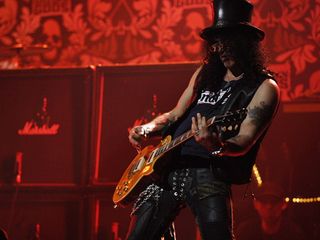
It must have felt good knowing how easily everything was coming together…
“It’s the way that I learned to work a long, long time ago and it’s a tried and true way: just do the work before you get in the studio so when you’re in the studio it just happens. I could never imagine sitting in the studio – I know a lot of bands who do this and some great records have come out this way – where you just go in with a couple of ideas and then it all just happens in the studio, but that’s a crap shoot and I just don’t have the patience for that.”
In your own words, you have a great 'musical camaraderie' as a band - is there a lot of kidding around in the studio?
“Yeah, we work hard but we have a really good time. We enjoy each other’s company and we love playing. Even considering the number of hours we put into it, it’s still relatively painless. I think everybody enjoys the challenge of getting things to work and seeing what new ideas are happening, getting inspired by one another.
"It’s funny because I never really analyse it, I never really give it that much thought, but looking back on it, what do we do? We go in, we just start jamming, we hang out, ‘Here’s the idea…’ The guys come up with their own way of playing it and it just morphs into something.”
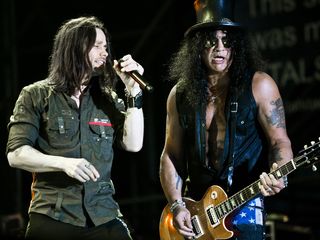
Guitars
You said the guys in the band have raised the bar in terms of their playing and that this has forced you to do the same. What do you put this down to – the fact you've toured together extensively?
“I think basically everyone’s a great rock ’n’ roll player. They’re real rock musicians at heart - deep down. So when we get together, we’ve built up a certain chemistry. We started out with a certain kind of chemistry and we’re just evolving from there.
"At this point everybody feels very comfortable just being themselves and doing what it is that they do best. It’s just an unsaid, natural synergy that happens. For example, this is probably one of Brent’s [Fitz, drummer] best records as a player, being able to do all the things he wanted to do. And the same with Todd [Kerns, bass] and the same for me. But having such a great rhythm section means I have to really fuckin’ put together some great guitar bits on top of it.
“The other thing that's cool is Mike Baskette was great. One of the reasons why I really wanted to work with him was he just loves guitars and it’s rare to get anyone who brings any ideas other than the ones you bring to the table as far as sounds and tones or anything like that. And that’s a limitation: you can only do as much as you know how to do in the studio and sometimes you really need to work with an engineer who knows something in the recording studio that you don’t know. That’s what Mike brought into it. He was so enthusiastic about getting guitar sounds. He would put as much time into that as I could possibly put it in – sometimes more so. It was really inspiring. I haven’t had that in a long, long time.”
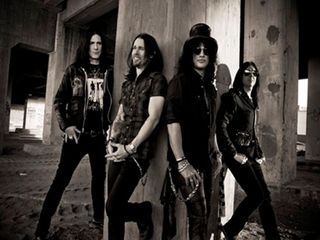
© Travis Shinn
Did Mike’s input include suggesting different guitars, amps or pedals?
“Everything. In the studio I’m playing my guitar parts and then I’m playing the other guitar player’s guitar parts because we’re a five-piece band, we tour with two guitar players. and so I like to do it like that. I’ve got my sound together, but what is the other guitar sound going to be? That’s when we starting using a lot of different guitars and a lot of different amps to have this marriage of left and right guitar sounds. I had a Gibson ES-175 and a ES-135.”
You used your 'Appetite' Les Paul [a Gibson replica made by the late Kris Derrig and Slash's key studio guitar since the Appetite For Destruction sessions] for most of the leads, but did you use any other guitars for any lead parts on the record?
“It was primarily my Appetite guitar and a ’57 Goldtop [Les Paul] Reissue. Both of those are just great-sounding guitars. The Goldtop I use for certain applications because nothing else sounds like that particular guitar.”
Mike Baskette and Ace Bergman have complained about keeping your guitars in tune and blamed your pick, what size pick do you use – is it the Dunlop Tortex 1.14mm?
“I use the biggest ones that Dunlop makes, but also play very hard to, I hit hard. The thing is to stretch the strings out and hit the guitar, just pull on it for long enough before I start playing it for it to stay in tune. If you put new strings on it, you really need to break it in hard.
"And then also on top of that, the Derrig guitar is almost a vintage guitar now and it gets a lot of use in the studio. It’s become a little bit temperamental. I often compare it to a woman: you have to treat it just right otherwise it’ll bite back. We’re like an old married couple. All things considered, Ace is a great guitar tech and Mike is very anal about tuning, as am I, so we spent probably more time tuning than we did anything else.”
It’s funny that you say the Derrig guitar is now a vintage guitar – did you ever imagine you’d hear yourself saying those words?
“It never crossed my mind!” [Laughs.]
Seymour Duncan sent you some pickups to use on the record. Which models did you end up using?
“They sent me a bunch of different pickups. Some guitars, on sight I just know inherently what they sound like, but if you have the wrong pickup in it then it’s not gonna sound like that. And some of my guitars are newer guitars that I might have swapped pickups out of – they don’t have the stock pickups in them. Like my Explorer, we changed pickups in that a few times to get it to the right output that I wanted to get out of that guitar.
"And there was a couple of other guitars that we experimented on with different pickups in. I know we used the Seymour Duncan JB. They have a pickup that’s the Alnico 2 but it’s called The Silver and it’s got silver coil wire instead of copper and those are fucking phenomenal pickups. I put those in a couple of guitars, the Goldtop being one of them and also the Explorer. I have a tobacco sunburst Joe Perry guitar which I put the JB humbuckers in. The real high-output stuff I don’t really get into. I prefer the lower-output pickups.”
You also had some Gibson Melody Makers and Les Paul Juniors in the studio. What did you use those for?
“Mostly for rhythm. I have two Juniors: an old one and a new one that my previous guitar tech, Adam Day, gave me for my birthday or Christmas a few years back. I actually ended up using the new one, which sounds better than the old one. I used it for slide, I used it for the left speaker rhythm guitars. Those hollowbodies, though, I have to admit, I used a lot.”
What was it about the hollowbodies that you liked so much on these sessions?
“They just sound f****** phenomenal. I have a few 335s that I’ve used on the road when I was with Velvet Revolver. They sounded OK. I have a Gretsch that I’ve used. But these just had a really clear, natural sort of rock ’n’ roll tone and they distort in a certain way that just sounds really natural when you put them through a Marshall – a really punchy character.
"I was really surprised. The 335 was actually Mike Baskette’s and we just used it because I didn’t bring that many guitars to the studio and we’d just pick up anything to see if it worked.”
The fanpack, Classic Rock Presents Slash Featuring Myles Kennedy And The Conspirators World On Fire is available to preorder here. It includes the full album, 116 page magazine, giant double-sided A1 poster and metal pin badge.
European tour dates:
Mon 10 Nov Dublin, O2 Arena - IRELAND
Wed 12 Nov Paris, Le Zenith - FRANCE
Sat 15 Nov Basel, St. Jakobshalle - SWITZERLAND
Sun 16 Nov Turin, Palaolimpico – ITALY
Mon 17 Nov Florence, Mandela Forum – ITALY
Wed 19 Nov Vienna, Stadthalle – AUSTRIA
Thu 20 Nov Krakow, Krakow Arena – POLAND
Sat 22 Nov Munich, Zenith – GERMANY
Sun 23 Nov Cologne, Palladium – GERMANY
Mon 24 Nov Amsterdam, Heineken Music Hall – THE NETHERLANDS
Wed 26 Nov Brussels, Forest Club – BELGIUM
Fri 28 Nov Manchester, Phones 4U Arena – UK
Sat 29 Nov Leeds, Leeds Arena – UK
Mon 1 Dec Birmingham, LG Arena – UK
Tue 2 Dec London, Wembley Arena – UK
Thu 4 Dec Glasgow, Hydro Arena - UK

Rob is the Reviews Editor for GuitarWorld.com and MusicRadar guitars, so spends most of his waking hours (and beyond) thinking about and trying the latest gear while making sure our reviews team is giving you thorough and honest tests of it. He's worked for guitar mags and sites as a writer and editor for nearly 20 years but still winces at the thought of restringing anything with a Floyd Rose.

"Reggae is more freeform than the blues. But more important, reggae is for everyone": Bob Marley and the Wailers' Catch a Fire, track-by-track

“Part of a beautiful American tradition”: A music theory expert explains the country roots of Beyoncé’s Texas Hold ‘Em, and why it also owes a debt to the blues

"Reggae is more freeform than the blues. But more important, reggae is for everyone": Bob Marley and the Wailers' Catch a Fire, track-by-track

“Part of a beautiful American tradition”: A music theory expert explains the country roots of Beyoncé’s Texas Hold ‘Em, and why it also owes a debt to the blues


